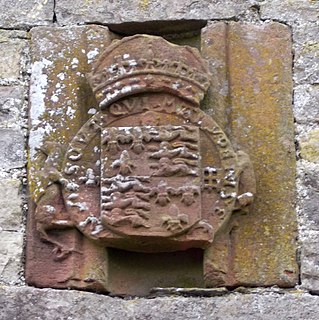Related Research Articles
A Postmaster General, in Anglosphere countries, is the chief executive officer of the postal service of that country, a ministerial office responsible for overseeing all other postmasters. The practice of having a government official responsible for overseeing the delivery of mail throughout the nation originated in England, where a 'Master of the Posts' is mentioned in the King's Book of Payments, with a payment of £100 being authorised for Sir Brian Tuke as 'Master of the King's Post' in February 1512. Belatedly, in 1517, he was officially appointed to the office of 'Governor of the King's Posts', a precursor to the office of Postmaster General of the United Kingdom, by King Henry VIII. In 1609, it was decreed that letters could only be carried and delivered by persons authorised by the Postmaster General.
James Gairdner was a British historian. He specialised in 15th-century and early Tudor history, and among other tasks edited the Letters and Papers of the Reign of Henry VIII series.
John Sherren Brewer, Jr. was an English clergyman, historian and scholar. He was a brother of E. Cobham Brewer, compiler of Brewer's Dictionary of Phrase & Fable.

The Lord Great Chamberlain of England is the sixth of the Great Officers of State, ranking beneath the Lord Privy Seal and above the Lord High Constable. The Lord Great Chamberlain has charge over the Palace of Westminster.
Richard Rawlins was Bishop of St David's between the years 1523 and 1536.

Claude d'Annebault was a French military officer; Marshal of France (1538–52); Admiral of France (1543–1552); and Governor of Piedmont in 1541. He led the French invasion of the Isle of Wight in 1545. Annebault was governor of Normandy and a very powerful figure during the reign of King Francis.
Sir Thomas LeighorLegh (?1511-1545) was an English jurist and diplomat, who played a key role as agent of Henry VIII and Thomas Cromwell in the Dissolution of the Monasteries.
Sir George Blagge was an English courtier, politician, soldier and a minor poet. He was the Member of Parliament for Bedford from 1545 to 1547, and Westminster from 1547 to 1551, during the reign of Edward VI. His trial and condemnation for heresy in 1546 earned him a place in Protestant martyrology. His family surname was frequently rendered Blage by contemporaries, while another variant was Blake.

Sir Brian Tuke was the secretary of Henry VIII and Cardinal Wolsey. He became treasurer of the household.

Edmund Harman (c.1509–1577), was the barber-surgeon of Henry VIII of England and a member of his Privy Chamber. He served alongside Thomas Wendy and George Owen.

Chacombe Priory was a priory of Augustinian canons at Chacombe, Northamptonshire, England.
Dr Richard Gwent was a senior ecclesiastical jurist, pluralist cleric and administrator through the period of the Dissolution of the Monasteries under Henry VIII. Of south Welsh origins, as a Doctor of both laws in the University of Oxford he rose swiftly to become Dean of the Arches and Archdeacon of London and of Brecon, and later of Huntingdon. He became an important figure in the operations of Thomas Cromwell, was a witness to Thomas Cranmer's private protestation on becoming Archbishop of Canterbury, and was Cranmer's Commissary and legal draftsman. He was an advocate on behalf of Katherine of Aragon in the proceedings against her, and helped to deliver the decree of annulment against Anne of Cleves.
Edmund Harvel was a 16th-century English diplomat.
Letters and Papers of the Reign of Henry VIII is a multi-volume edition of documents from the reign of Henry VIII of England. The series was edited by J. S. Brewer, James Gairdner and R. H. Brodie, and originally published between 1862 and 1932. It remains a key resource for historians of the period, and is now freely available online as part of British History Online.
De vera obedientia is a treatise written in 1535 by the Bishop of Winchester Stephen Gardiner in support of the annulment of Henry VIII of England's marriage to Katherine of Aragon. It stresses the obedience of the individual within a society's hierarchy as put in place by God: wives to husband, servants to masters, and subjects to their King.
Luis Sarmento was the Imperial ambassador to Portugal in 1536. He represented Charles V, Holy Roman Emperor and King of Spain.
George Wulweber was an English Protestant during the reign of Henry VIII.
James Horsewell or Horswell was Mayor and MP of Plymouth, England.

Sir James Leyburn, also Laybourne, Labourn, etc., was a senior representative of one of the powerful families within the Barony of Kendal. He was at different times a Justice of the Peace for Westmorland, Escheator for Cumberland and Westmorland, and Commissioner for the survey of the monasteries of Lancashire. He was caught up in the troubles at Kendal during the Pilgrimage of Grace (1536-1537). As an assistant to Sir Thomas Wharton, Deputy Warden of the West March, he took an important part in the Battle of Solway Moss (1542). He was one of the two MPs for Westmorland in 1542 and 1545.
William Popley ., was an English mercer and land owner, whose association with Thomas Cromwell, enabled him to take advantage of the opportunities presented by the dissolution of the monasteries to secure extensive landed estates.
References
- ↑ Letters and Papers of the Reign of Henry VIII , ed. James Gairdner, vol. X, no. 394
- ↑ Letters and Papers of the Reign of Henry VIII, ed. James Gairdner, vol. X, no. 413